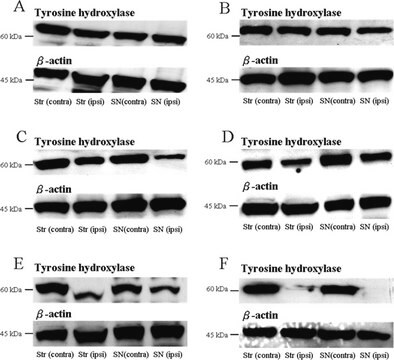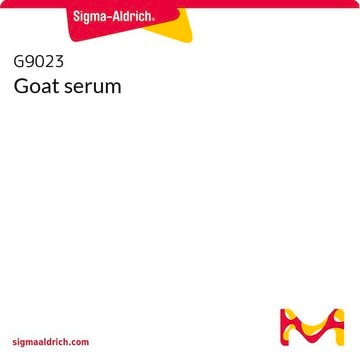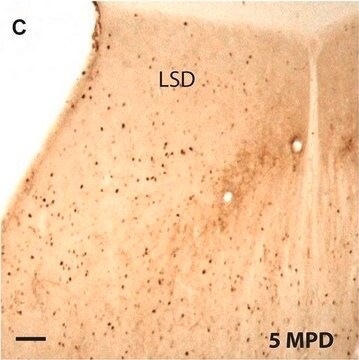추천 제품
생물학적 소스
rabbit
Quality Level
결합
unconjugated
항체 형태
IgG fraction of antiserum
항체 생산 유형
primary antibodies
클론
polyclonal
형태
buffered aqueous solution
분자량
antigen 19 kDa
종 반응성
rat, human
기술
immunohistochemistry (formalin-fixed, paraffin-embedded sections): 1:200 using formic acid treated sections of Alzheimer′s Disease brain
microarray: suitable
western blot: 1:1,000 using extract of rat brain homogenate
UniProt 수납 번호
저장 온도
−20°C
타겟 번역 후 변형
unmodified
유전자 정보
human ... SNCA(6622)
rat ... Snca(29219)
일반 설명
The synucleins are a family of soluble presynaptic proteins that are abundant in neurons and include α-synuclein, β-synuclein, and γ-synuclein. Human α-synuclein (also known as the non-amyloid component of plaques precursor protein or NACP) is a 140-amino acid polypeptide that is encoded by a gene on chromosome 4. It was originally isolated from plaques of Alzheimer′s disease (AD) brains as a 19 kDa protein precursor of the highly hydrophobic 35-amino acid peptide, nonamyloid component (NAC) of plaques. The NAC can self-aggregate into fibrils and induce aggregation of the β-amyloid peptide. α-Synuclein is highly abundant in presynaptic terminals, and is a major component of Lewy bodies (LBs). Pathogenic point mutations in the α-synuclein gene are linked to familial Parkinson′s disease (PD) in rare kindreds. However, most neurodegenerative disorders with LBs are associated with abnormal accumulation of wild-type, α-synuclein. α-Synuclein is expressed primarily in brain, but is also expressed in low levels in all tissues examined except liver.
특이성
Rabbit polyclonal anti-α-Synuclein antibody recognizes human and rat α-synuclein. Staining of α-synuclein in immunoblotting is specifically inhibited by the immunizing peptide
면역원
synthetic peptide corresponding to a sequence near the C-terminus of human α-synuclein (amino acids 111-132 with C-terminally added lysine) conjugated to KLH. This sequence is highly conserved (90% homology) in mouse and rat α-synuclein. This sequence has no homology with β- and γ-synuclein.
애플리케이션
Rabbit polyclonal anti-α-Synuclein antibody is used to tag α-Synuclein for detection and quantitation by immunocytochemical and immunohistochemical (IHC) techniques, such as immunoblotting. It is also used as a probe to determine the presence and roles of α-Synuclein in plaques of Alzheimer′s disease (AD) brains.
물리적 형태
Solution in 0.01 M phosphate buffered saline, pH 7.4, containing 15 mM sodium azide.
면책조항
Unless otherwise stated in our catalog or other company documentation accompanying the product(s), our products are intended for research use only and are not to be used for any other purpose, which includes but is not limited to, unauthorized commercial uses, in vitro diagnostic uses, ex vivo or in vivo therapeutic uses or any type of consumption or application to humans or animals.
적합한 제품을 찾을 수 없으신가요?
당사의 제품 선택기 도구.을(를) 시도해 보세요.
Storage Class Code
10 - Combustible liquids
WGK
WGK 3
Flash Point (°F)
Not applicable
Flash Point (°C)
Not applicable
시험 성적서(COA)
제품의 로트/배치 번호를 입력하여 시험 성적서(COA)을 검색하십시오. 로트 및 배치 번호는 제품 라벨에 있는 ‘로트’ 또는 ‘배치’라는 용어 뒤에서 찾을 수 있습니다.
이미 열람한 고객
Geert Callewaert et al.
Frontiers in genetics, 11, 266-266 (2020-05-28)
The yeast Saccharomyces cerevisiae is a powerful model to study the molecular mechanisms underlying α-synuclein (α-syn) cytotoxicity. This is due to the high degree of conservation of cellular processes with higher eukaryotes and the fact that yeast does not endogenously
Lysosomal dysfunction in the brain of a mouse model with intraneuronal accumulation of carboxyl terminal fragments of the amyloid precursor protein
Kaur G, et al.
Molecular Psychiatry, 22(7), 981-981 (2017)
Identification of a caspase-derived N-terminal tau fragment in cellular and animal Alzheimer's disease models
Corsetti V, et al.
Molecular and Cellular Neurosciences, 38(3), 381-392 (2008)
Extracellular truncated tau causes early presynaptic dysfunction associated with Alzheimer?s disease and other tauopathies
Florenzano F, et al.
Oncotarget, 8(39), 64745-64778 (2017)
From the cover: arsenic induces accumulation of alpha-synuclein: implications for synucleinopathies and neurodegeneration
Cholanians AB, et al.
Toxicological Sciences, 153(2), 271-281 (2016)
자사의 과학자팀은 생명 과학, 재료 과학, 화학 합성, 크로마토그래피, 분석 및 기타 많은 영역을 포함한 모든 과학 분야에 경험이 있습니다..
고객지원팀으로 연락바랍니다.










